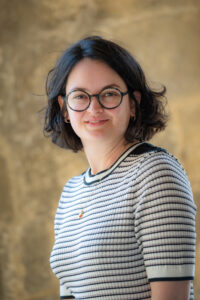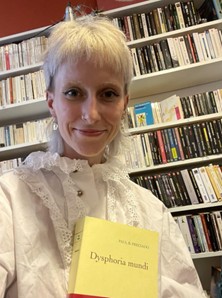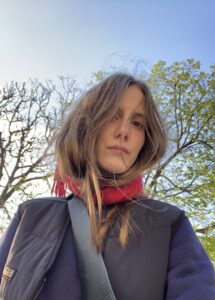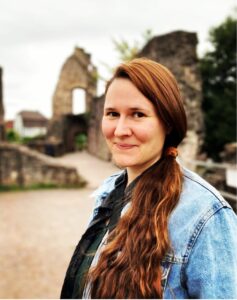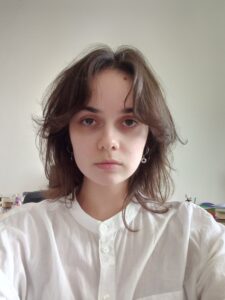“The court of heirs: memory of the GULAG in contemporary Russian-language literature (2000-2022)”
Research areas 1 and 2: Displacements, “Dépaysements” and Discrepancies: People, Knowledge and Practices & Norms et transgressions
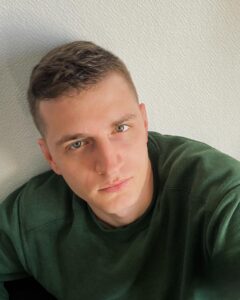 Ses recherches portent sur la fiction littéraire en langue russe publiée entre 2000 et 2020, ayant pour sujet principal le Goulag et la transmission de sa mémoire dans l’espace post-soviétique. Cette production, particulièrement significative au tournant des années 2010 (Jones 2024), s’inscrit à la fois dans l’essor global du phénomène de la « post-mémoire » (Hirsch 2012) et dans un cadre politique spécifique, marqué par des tensions croissantes entre la Russie et les autres États issus de la dislocation de l’URSS sur le terrain de l’histoire (Koposov 2018), ainsi que par un durcissement des politiques répressives du régime de Poutine à l’égard de ses opposants.
Ses recherches portent sur la fiction littéraire en langue russe publiée entre 2000 et 2020, ayant pour sujet principal le Goulag et la transmission de sa mémoire dans l’espace post-soviétique. Cette production, particulièrement significative au tournant des années 2010 (Jones 2024), s’inscrit à la fois dans l’essor global du phénomène de la « post-mémoire » (Hirsch 2012) et dans un cadre politique spécifique, marqué par des tensions croissantes entre la Russie et les autres États issus de la dislocation de l’URSS sur le terrain de l’histoire (Koposov 2018), ainsi que par un durcissement des politiques répressives du régime de Poutine à l’égard de ses opposants.
Sa réflexion se concentre ainsi sur une période au cours de laquelle la mémoire du Goulag revêt une actualité politique significative, soulevant des questions cruciales sur le rapport entre le citoyen et l’État, la Russie et ses voisins. Ce corpus littéraire est considéré, dès lors, comme l’expression de la variété de positions idéologiques qui divisent le débat intellectuel russophone et qui trouvent dans l’histoire des répressions soviétiques un terrain de confrontation majeur. En l’absence d’une sanction judiciaire des violences perpétrées par l’État soviétique et d’une interprétation consensuelle de ces événements, la fiction permet la création d’un espace symbolique où la mise en récit se configure comme une manière de porter un jugement sur le passé.
Sa thèse aborde cette question à travers l’étude de neuf œuvres de fiction publiées entre 2001 et 2019, dans lesquelles l’élaboration d’un jugement rétrospectif est prise en charge par un personnage contemporain à la rédaction du roman : « l’héritier ». Le développement de cette notion – déjà opératoire dans le champ des études mémorielles (Jurgenson & Prstojevic 2012 ; Barjonet 2022 ; Panico 2024) – constitue l’un des enjeux de cette recherche. À travers la figure de l’héritier, ces textes mettent en scène un processus de réinvestissement subjectif du passé, dont il s’agit d’examiner à la fois le déploiement narratif et l’imbrication avec les discours des différents « acteurs mémoriels » (memory actors) (Bogumił 2018) à l’œuvre dans le contexte post-soviétique.
Formation académique :
– Septembre 2022 – En cours : Doctorat en études slaves à Sorbonne Université/Eur’ORBEM, sous la direction d’Hélène Mélat et Luba Jurgenson.
– 15-19 avril 2024 : École de printemps 4EU+ Pluralities of Memory Spring School: Borderlands of Memory, organisée par l’Université Charles de Prague.
– 11-15 juillet 2022 : École d’été 4EU+ Digital Memories: problems, methodologies, theories, organisée par l’Université de Milan.
– 2020-2022 : Master de recherche. Spécialité : Littérature russe. Sorbonne université.
Publications scientifiques (sélection) :
– « Le cinéma en juge de l’histoire ? Le spectre de l’année 1938 dans le film Le capitaine Volkonogov s’est échappé », Revue des Etudes slaves, vol. XCV, n° 4, 2024, p. 565-580.
– « Tchapaev devint un zombie, mais il passait encore à la télé. La littérature russe des années 2000 dans les décombres de l’idéologie soviétique », Les Grandes figures historiques dans les lettres et les arts, n° 14, 2025. En ligne : https://www.peren-revues.fr/figures-historiques/651?lang=en.
– « Zapretnye rukopisi. Arheologija semejnoj pamjati v sovremennoj russkoj literature » [Les manuscrits interdits. Archéologie de la mémoire familiale dans la littérature russe contemporaine], Novoe Literaturnoe Obozrenie, n° 193/3, 2025, pp. 212-227.
Communications (sélection) :
– « D. Bykov, Z. Prilepin: 20 let opravdanij sovetskogo Terrora » [D. Bykov et Z. Prilepine en miroir : 20 ans de justifications des répressions soviétiques]. Colloque international Being a writer under Putin. Inalco, Paris, mars 2025.
– « Echoes of Injustice: Russian-speaking literature coming to terms with the Soviet repressions ». Congrès annuel de l’Association canadienne des slavistes. Montréal, juin 2024.
– « Performing the Duty of Memory: Five Time Travel Narratives of the Great Patriotic War ». Colloque international Historical Past and Contemporary Propaganda in the Global Context. Bard College et Smolny Beyond Borders, Berlin, juin 2024.
Expériences d’enseignement (sélection):
– Septembre 2022-mai 2025. Cours « Commentaire littéraire ». TD hebdomadaire destiné aux étudiants en deuxième année de licence LLCER Russe. Sorbonne Université.
– Septembre 2022-Mai 2023. Cours « Auteur, narrateur, personnage ». Séminaire bi-hebdomadaire destiné aux étudiants du Master recherche « Monde russe », spécialité littérature. Sorbonne Université.
Organisation de manifestations scientifiques :
– Avril 2023 – En cours. Cycle de rencontres « L’Observatoire du Sensible » (Sorbonne Université/Eur’Orbem, CREE, Université de Lille) : cycle de rencontres avec des auteurs russophones contemporains, parmi lesquels : Maria Stepanova, Daria Serenko, Galina Rymbu, Sergej Lebedev, Sasha Filipenko.
– 18-20 juin 2025. Conférence du Collettivo Giovani Slavisti. Université de Naples « L’Orientale ».
– 4-7 avril 2023. Colloque Sexe, sexualité, relations sexuelles dans la science-fiction. 11e Colloque international de Stella Incognita. Sorbonne Université (UFR d’études slaves, faculté des Lettres) et de l’École Polytechnique (Département Langues et Cultures et Chaire arts et sciences) ; l’École des Arts Décoratifs – PSL et la Fondation Daniel et Nina Carasso ; des laboratoires de recherche Eur’orbem et LinX, du laboratoire junior « Passage » ; de l’Institut d’études slaves et du Cinéma Le St André des Arts.
Autres activités et affiliations :
– Depuis juin 2025. Membre du conseil d’administration de l’Institut d’Études slaves.
– Depuis septembre 2024. Co-coordinateur, avec Sarah Gruszka, du pôle « Histoire, mémoire et arts » du collectif de recherche Coruscant, branche européenne du Russia Program de l’Institute for European, Russian and Eurasian Studies (IERES) à la George Washington University.
– Depuis septembre 2023. Représentant du Labo Junior « Passage », constitué par les doctorants de l’UMR Eur’ORBEM.

